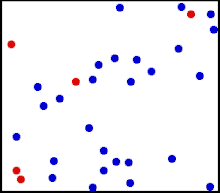File:Translational motion gif with ffmpeg2theora 024 10fps.ogv
Translational_motion_gif_with_ffmpeg2theora_024_10fps.ogv (Ogg Theora video file, length 37 s, 300 × 264 pixels, 93 kbps, file size: 421 KB)
Captions
Captions
Summary[edit]
| DescriptionTranslational motion gif with ffmpeg2theora 024 10fps.ogv |
English: Motion of gas molecules, re-encoded from original GIF at 10 frames per second
Español: Animación mostrando la agitación térmica de un gas. Cinco partículas han sido coloreadas de rojo para facilitar el seguimiento de sus movimientos.
Русский: Хаотическое тепловое движение на плоскости частиц газа таких как атомы и молекулы |
| Date | (original) 2010-04-28 (converted to OGV) |
| Source |
This file was derived from: Translational motion.gif English: Converted as follows:
|
| Author | A.Greg, en:User:Greg L |
| Other versions |
 |
Translational motions—the randomized thermal vibrations of fundamental particles such as atoms and molecules—gives a substance its “kinetic temperature.” Here, the size of helium atoms relative to their spacing is shown to scale under 1950 atmospheres of pressure. These room-temperature atoms have a certain, average speed (slowed down here two trillion fold). At any given instant however, a particular helium atom may be moving much faster than average while another may be nearly motionless. The rebound kinetics of elastic collisions are accurately modeled here. If the velocities over time are plotted on a histogram, a Maxwell-Boltzmann distribution curve will be generated. Five atoms are colored red to facilitate following their motions.
Note that whereas the relative size, spacing, and scaled velocity of the atoms shown here accurately represent room-temperature helium atoms at a pressure of 1950 atmospheres, this is a two-dimensional scientific model; the atoms of gases in the real world aren’t constrained to moving in two dimensions in windows precisely one atom thick. If reality worked like this animation, there would be zero pressure on the two faces of the box bounding the Z-axis. The value of 1950 atmospheres is that which would be achieved if room-temperature helium atoms had the same inter-atomic separation in 3-D as they have in this 2-D animation.
Licensing[edit]
|
NOTE: "subject to disclaimers" below may not actually apply, this was tagged with {{GFDL-user-en}}, and after May 2007, en:Template:GFDL-self did not require disclaimers. Please check the image description page on the English Wikipedia (or, if it has been deleted, ask an English Wikipedia administrator). See Wikipedia:GFDL standardization for details. | ||||||||
Greg L at the English-language Wikipedia, the copyright holder of this work, hereby publishes it under the following license:
| ||||||||
|
Note: This tag should not be used. For images that were released on the English Wikipedia using either GFDL or GFDL-self with disclaimers, use {{GFDL-user-en-with-disclaimers}}. For images without disclaimers please use {{GFDL-user-en-no-disclaimers}} instead. If you are the copyright holder of files that were released on Wikipedia, please consider removing the disclaimers. |
File history
Click on a date/time to view the file as it appeared at that time.
| Date/Time | Thumbnail | Dimensions | User | Comment | |
|---|---|---|---|---|---|
| current | 20:48, 28 April 2010 | 37 s, 300 × 264 (421 KB) | 84user (talk | contribs) | == {{int:filedesc}} == {{Information |Description=Motion of gas molecules {{es|Animación mostrando la agitación térmica de un gas. Cinco partículas han sido coloreadas de rojo para facilitar el seguimiento de sus movimientos.}} {{ru|Хаотическ |
You cannot overwrite this file.
File usage on Commons
The following 2 pages use this file:
Transcode status
Update transcode statusMetadata
This file contains additional information such as Exif metadata which may have been added by the digital camera, scanner, or software program used to create or digitize it. If the file has been modified from its original state, some details such as the timestamp may not fully reflect those of the original file. The timestamp is only as accurate as the clock in the camera, and it may be completely wrong.
| Software used |
|---|
